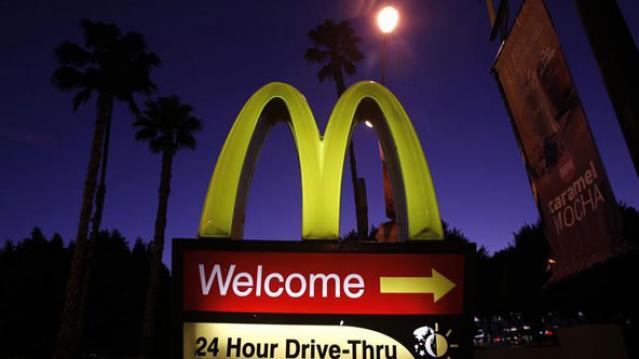McDonald’s Slims Down in the U.S. for the First Time

For the first time in at least 45 years — and maybe the first time in its history — McDonald’s says that this year it will close more restaurants in the U.S. than it opens.
An Associated Press review of McDonald’s filings with the Securities and Exchange Commission found that the company hasn’t slimmed down the number of restaurants it operates in the U.S. since at least 1970. McDonald’s as we know it was founded in 1955 and grew quickly in its early years, making it likely that 2015 will be the first time it takes down more Golden Arches than it puts up in the U.S.
Related: Why Chipotle Wants to Give Its Workers More Than a McJob
McDonald’s does shutter underperforming locations every year, but up until now the number of closings has been outweighed by new openings. The world’s biggest hamburger chain has been struggling to grow sales as consumers turn to chains like Chipotle and Five Guys Burgers and Fries, which market themselves as serving better food and ingredients.
McDonald’s is still growing globally, though. It has about 36,000 locations across the globe and plans to expand that total by about 300 this year. In addition, the chain is still indisputably the country’s largest hamburger chain, with more than twice as many restaurants as its main rival, Burger King.
McDonald’s spokeswoman Becca Hary told the AP that relative to the roughly 14,300 U.S. locations, the net reduction in U.S. stores would be “minimal,” though she declined to give an exact number.
Increasing Number of Americans Delay Medical Care Due to Cost: Gallup

From Gallup: “A record 25% of Americans say they or a family member put off treatment for a serious medical condition in the past year because of the cost, up from 19% a year ago and the highest in Gallup's trend. Another 8% said they or a family member put off treatment for a less serious condition, bringing the total percentage of households delaying care due to costs to 33%, tying the high from 2014.”
Number of the Day: $213 Million

That’s how much the private debt collection program at the IRS collected in the 2019 fiscal year. In the black for the second year in a row, the program cleared nearly $148 million after commissions and administrative costs.
The controversial program, which empowers private firms to go after delinquent taxpayers, began in 2004 and ran for five years before the IRS ended it following a review. It was restarted in 2015 and ran at a loss for the next two years.
Senate Finance Chairman Chuck Grassley (R-IA), who played a central role in establishing the program, said Monday that the net proceeds are currently being used to hire 200 special compliance personnel at the IRS.
US Deficit Up 12% to $342 Billion for First Two Months of Fiscal 2020: CBO

The federal budget deficit for October and November was $342 billion, up $36 billion or 12% from the same period last year, the Congressional Budget Office estimated on Monday. Revenues were up 3% while outlays rose by 6%, CBO said.
Hospitals Sue to Protect Secret Prices

As expected, groups representing hospitals sued the Trump administration Wednesday to stop a new regulation would require them to make public the prices for services they negotiate with insurers. Claiming the rule “is unlawful, several times over,” the industry groups, which include the American Hospital Association, say the rule violates their First Amendment rights, among other issues.
"The burden of compliance with the rule is enormous, and way out of line with any projected benefits associated with the rule," the suit says. In response, a spokesperson for the Department of Health and Human Services said that hospitals “should be ashamed that they aren’t willing to provide American patients the cost of a service before they purchase it.”
See the lawsuit here, or read more at The New York Times.
A Decline in Medicaid and CHIP Enrollment

Between December 2017 and July 2019, enrollment in Medicaid and the Children's Health Insurance Program (CHIP) fell by 1.9 million, or 2.6%. The Kaiser Family Foundation provided an analysis of that drop Monday, saying that while some of it was likely caused by enrollees finding jobs that offer private insurance, a significant portion is related to enrollees losing health insurance of any kind. “Experiences in some states suggest that some eligible people may be losing coverage due to barriers maintaining coverage associated with renewal processes and periodic eligibility checks,” Kaiser said.


